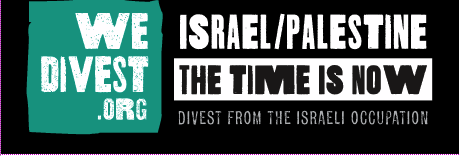Targeted BDS
 To BDS or not to BDS? If You’re a Liberal Zionist, Try TBDS
To BDS or not to BDS? If You’re a Liberal Zionist, Try TBDS
Jeremiah Haber,2nd March 2011
See also Rachel Gai, Talking about BDS at J Street
WeDivest.org launched with letter from Rabbi Alissa Wise
I had the privilege of meeting Rebecca Vilkomerson, director of Jewish Voice for Peace, in Jerusalem a few months ago. At the time I was deeply pessimistic about the future. After months of reading Haaretz‘s print edition, of seeing a society I once fell in love with sink deeper and deeper into a moral morass, I was amazed to find her upbeat. “Every one here seems so pessimistic,” she said. “Things are looking much better in America.” What she meant was that that the direct action program that JVP and others have been engaging in was beginning to show results – the solid support for Israel’s policies of hafrada and expropriation was not only crumbling, but fundamental questions about Zionism were being asked by the younger generation of those who care about their Judaism, and even about the millions of Jews living in Israel.
That feeling of upbeatness spilled over to the recently concluded J Street Conference. Actually, there were two J Street Conferences: the one for the old guard of liberal Zionists, those who actually are interested to hear what failed negotiators like Dennis Ross and Ron Pundak have to say; and the other for, well, “Beinart’s army” – the Jews who would be perfectly happy to see Jewish self-determination fulfilled in an Israeli-Palestinian entity or entities that replace the Jewish ethnocracy founded hastily, and with so much injustice, in 1948. These Jews want to see the end of the regime of ethnic privilege, to quote Asaf Sharon, of the Sheikh Jarrah Solidarity movement. (For a sense of that upbeatness, you won’t find a better report than Phil Weiss’s here. If there were a National Jewish Award for optimism, it should rightly go to Phil and to Mondoweiss.)
The question of questions is..how do we get there? There is no single answer and there is no single way. But we won’t get anywhere without building coalitions. So once again, I am writing to my liberal Zionist friends to endorse the Global BDS Solidarity Movement.
I am not asking liberal Zionists to support boycott, divestment, and sanctions in all cases. Let them target the boycotts, sanctions, and divestment, depending upon what they think will work, and what they think is right. Targeted BDS, or TBDS, has already been adopted by many Jewish progressives, including two of the three speakers who opposed BDS at the J-Street Conference session on that topic. But many have been hesitant to call what they advocate “BDS” because they don’t want to be tarred with the “deligitimization brush”, or because they are liberal Zionists who are concerned about their coalition partners.
When Bernard Avishai finds nothing wrong in boycotting settler’s products, why call that TBDS? Well, for better or for worse, the BDS label is now a worldwide trademark, and it is a rallying point for groups opposed to ethnic injustice against Palestinians. At J- Street, the question, “Do you support BDS?” popped up all over the place. And why? Because people want Israel to understand that there are consequences for their actions, that the world won’t accept what they do in silence. The Global BDS movement is not merely against the Occupation, but also against ethnic discrimination against Palestinians within Israel, and against those who are barred from returning to their homes. Global BDS is at its core an anti ethnic-discrimination movement. And the common denominator for all the progressive movements on Israel should be just that – opposing ethnic discrimination.
Actually, I would prefer another trademark besides BDS, one that articulates a vision for a decent, if not just society for Palestinians and Israelis. Perhaps that trademark will emerge, perhaps BDS will lead to it. But in the meantime, supporters of TBDS or of BDS should work together, and not against each other, in trying to advance the vision via non-violent platforms like BDS.
Were a colleague to ask me whether he should accept an invitation to go to Israel to speak, I would say to him, “Go to Israel; deliver your speech; but please, go to Hebron, Bil’in, Taybeh, or Sheikh Jarrah. See with your own eyes; become a witness. Return and get active.” Some one else may say to the same colleague, “Don’t go to Israel; let them understand by your absence your disapproval of their policies.” Let my colleague make her decision, but she should also know that both her colleagues are on the same side – and that our disagreement is tactical. (I happen to support the international artistic boycott of Israel proper; at least I do at the time of writing today.)
At the moment, BDS is largely symbolic – it doesn’t really hurt Israel’s economy to the detriment of Israeli citizens. (Would that other sanctions be so considerate of civilians) But it does say to the world, Israel is not a normal state; its actions are reprehensible, and there will be consequences.
Liberal Zionist Jews who care deeply about Israelis should ask themselves, What do I do when a beloved relative’s addiction has caused him to become violent and abusive? Should I talk with him and try to mend his ways? Should I go to the authorities, thereby shaming him and risking our relationship? Or should I just try to forget about it, and hope for the best?
When somebody reports an abusive family member to the police, she is not delegitimizing him or demonizing him. She is protecting the lives of those around him, and of himself.
Its time for an intervention.
WeDivest.org launched with letter from Rabbi Alissa Wise
Dear Supporter,
Earlier this week, I was reminded of one of my first lessons in effective organizing: boycotts, divestment campaigns, and government sanctions work.
A quick flip through any book on effective social change will show you:
- In Alabama in 1955 it was the Montgomery Bus Boycott.
- In 1965 in Delano, California, it was the United Farm Workers’ strike and call for boycott of California grape growers.
- And in 1985, it was Artists United Against Apartheid organizing in Sun City, South Africa.
These movements succeeded because– instead of telling people to wait for government leaders to do the right thing– they gave people powerful tools they could use to end injustice. Here. And now.
I think it’s time to use these tools to bring an end the Israeli occupation of Palestine. Don’t you? It’s time to take the future into our own hands.
Please join me in saying, “We divest.”
Click here to ask one of the world’s largest retirement funds to divest from Israel’s occupation.
The divestment campaign targeting TIAA CREF, one of the world’s largest retirement funds, is growing and thriving—over 20,000 petition signatures, dozens of in-person actions in the past 9 months, and over 20 organizational endorsers including the US Campaign to End the Occupation, Friends of Sabeel North America, Israeli Committee Against Home Demolitions, the US Palestinian Communities Network, and the Palestinian Boycott National Committee.
Over the next four months the campaign is heading into high gear and is announcing the launch of www.WeDivest.org, the online clearinghouse for the campaign to demand that TIAA-CREF divest from the Israeli occupation.
The launch of this website coincides with the beginning of an action-packed Spring signature drive on the campaign. The signature drive will culminate in the annual CREF shareholder meeting this July where we will deliver the many thousand petition signatures we’ve gathered. Be a part of making history.
Over the next four months there will be myriad opportunities to be part of the signature drive campaign all to be found on www.WeDivest.org.
As Martin Luther King Jr. reminded us during the many boycott efforts of the American Civil Rights Movement—the arc of history is long, but it bends toward justice. Be a part of the bend toward justice in Palestine/Israel—and tell TIAA-CREF to divest from Israel’s occupation.
In solidarity,
Rabbi Alissa Wise, National Organizer
Jewish Voice for Peace

